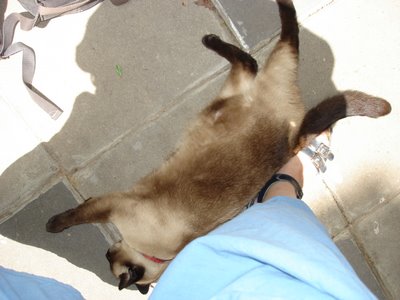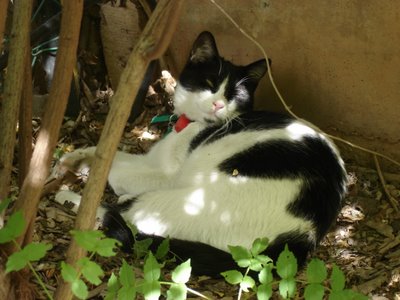Encounter on Agrippas Street
I was coming from the open-air market downtown, loaded with shopping bags and heading for the bus stop to catch a bus home, when I heard them: at least four excellent singers, two young men and two young women. One accompanied the group on guitar. Like a small choir, they sat on several levels of one of the new round stone seats in the section of Agrippas Street that was recently made into a pedestrian mall. Although the songs they sang were completely unfamiliar to me, they sounded beautiful: graceful, majestic cadences with full, gorgeous harmonies. After only a few moments, I was enthralled.
As I came closer to the group, I saw that I wasn’t the only one affected by the beauty of their singing. A small group of people had gathered to listen. One woman was recording them with her MP3 player. Another group of Israelis was listening eagerly, and with characteristic Israeli brashness demanded the members’ autographs when they finished a song.
As I listened to the music, I realized that the group was singing in Spanish. After a while, I was able to make out several of the words in the song: Señor. Maestro. Corazon. Cristo.
Oh, I thought, Christian pilgrims singing devotional songs under the stars in downtown Jerusalem. How lovely. It must be really exciting for them to be doing this, and what a beautiful memory they will have to take back home.
I approached the group with a smile and asked them who they were and where they were from. A young man answered: “We’re students from all over the world. Some of us study at the Hebrew University, and others study at other places.”
“Can I see your songbook?” I asked.
“Betah (sure),” the young man said, handing it to me.
I leafed through it, expecting to see some familiar Christian hymns that I remembered my friends singing in school. Maybe I would be lucky and there would be some traditional songs inside, songs without an explicitly Christian theme, maybe even some African-American spirituals, that I could sing together with them. But I didn’t find any. Instead, I found songs in both Hebrew and in English that referred to “Yeshua”—the Hebrew name of Jesus that Christian missionaries use to try to convince Jews to convert to Christianity.
Instantly, and for only an instant, I went back about a decade in time:
“I met a lovely musician at a restaurant downtown,” my sabra (Israeli-born) friend told me in Hebrew. “I spoke to him after he finished his set, and he told me that he is working on a recording of his own original music and that he is looking for a female singer. Perhaps you’d be interested? He wears a kippah, you know,” she finished.
How strange, I thought. Usually, men who wear kippot aren’t interested in working with women singers. But I went anyway, figuring that it was worth an hour of my time to investigate this possibility.
As the man and I spoke, I had the feeling that something was not quite right. I couldn’t put my finger on the reason, but I also couldn’t ignore my feelings. As he spoke, I noticed two things: among the names of all the musical contacts that he mentioned, not one name sounded familiar to me, or even Jewish. How strange for a Jewish musician in Jerusalem not to know any other Jewish musicians, I thought. The second was that his speech had a definite evangelical Christian flavor, which I recognized from certain television programs I used to watch sometimes, out of curiosity, as a child in upstate New York. For example, he used the word “anointed” to describe something very special, divinely inspired. At first, I tried to judge the situation favorably. Come on, I thought, give the guy a break. He could be a convert to Judaism from an evangelical background. After all, what about my friend Esther [not her real name]? That’s her story exactly, and once in a while she also uses expressions like “anointed,” so what’s the big deal?
Yes, I argued with myself, but when Esther uses one of those expressions, she stops talking and looks embarrassed. With her, it’s clearly a slip of the tongue. With him, it isn’t.
I really wanted to work with this man. His musicianship was excellent, his compositions stunning. He was working on setting chapters of the Psalms to music, and described to me how he woke up in the morning with lines of music already in his mind, waiting to be written down.
But too many things just didn’t add up. If he was Jewish, as he said he was, then why did he speak like an evangelical Christian? Why were all of his musical contacts, without exception, not Jewish? It occurred to me then that he might be connected with a missionary group. I hoped not. If he was, then it would be impossible for me to form a musical partnership with him, especially if his music was religious in character and was directed to an audience of seekers. If I joined up with him under those circumstances, I would be lending my aid to missionary efforts, helping the very groups that are trying to make my own people abandon their faith. And there is no way that I would ever do such a thing. According to Jewish law, that is one of the foulest acts of treason that a Jew can commit.
What to do? This man wasn’t too forthcoming about his background. All he would say was that he was Jewish, but I was starting to wonder. So I called a local counter-missionary organization to find out about the missionary groups that operate here. They gave me the names and backgrounds of some of the major ones, and the next time I spoke with the musician, I asked him point-blank whether he was a member.
To my disappointment, he was.
“Then I’m very sorry, but I can’t work with you,” I said. “You’re a wonderful musician and I would enjoy making music with you, but from everything you have described about your work, I have every reason to believe that it would be used for missionary purposes, and there is no way that I can lend my energy or my voice to that. I’m sure you understand.”
Coming back to the present and returning the songbook, I faced the group once more and said: “It’s clear to me that you are part of a community of worship. May I ask which one?”
“Oh, yes,” a young woman answered eagerly, and told me the name of her group. It was the same group to which the man from years ago had belonged. Oblivious to my lack of enthusiasm, the young woman continued to describe her group, giving me directions on how to reach it. “I’m sure you’ll like it very much,” she said. “It’s a wonderful congregation.”
“It’s not a congregation,” I told her flatly. “It’s a church.”
She looked at me uncertainly for a moment, then decided it was worth trying again. “Oh, well, then, you should try our other congregation,” she bubbled, giving me its name, a Hebrew phrase taken from a well-known Jewish hymn. “It’s very Israeli and has lots of Israelis. You’ll feel comfortable there, I’m sure. It’s a congregation congregation.”
I looked directly into her eyes and said: “No, it is not a congregation either. It’s a church.”
The sweet notes had gone sour beyond recall. I walked away.
(For more information about missionary groups that target Jews, see Meryl Yourish’s post: When Is a Rabbi Not a Rabbi?)
















